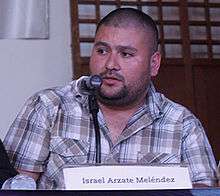Villas de Salvárcar massacre
The Villas de Salvárcar massacre occurred in Villas de Salvárcar, Ciudad Juárez on January 31, 2010, early in the morning. 15 young people died.[1] Alejandro Martínez-Cabrera of the El Paso Times stated that the event "brought attention to the city's social problems" and "caused outrage in Mexico because of the brutality".[2] People outside of Mexico also expressed outrage about the crime.[3] As a result, the federal government started the program "Todos Somos Juárez" (We are Juárez) to rejuvenate the city, and President of Mexico Felipe Calderón took additional measures against drug cartels.[2] Lorena Figueroa of the El Paso Times stated that due to the "brutality" of the crime, "The massacre gave notoriety" to Villas de Salvárcar.[3]
Event
A birthday party for Jesús Enríquez, who had turned 18, began on the evening of January 30, 2010 in a residence on Villa de Portal Street in Villas de Salvárcar, southeastern Ciudad Juárez. Those in attendance were high school and university students.[4] 60 persons were inside the house. Around midnight a group of 20 La Línea hitmen entered the residence and attacked the party guests. Immediately 14 of the persons were killed and 12 received injuries.[5] Of the deceased, one attended the Autonomous University of Chihuahua while the others were students at Plantel 9 del Colegio de Bachilleres and the Centro de Estudios de Bachillerato Técnico Industrial y de Servicios (CBTIS).[6]
Aftermath

On Sunday March 14, 2010, Mexican authorities arrested the accused lookout, Heriberto Martinez. By March 21 of that year, the Mexican military arrested four more individuals.[1]
Israel Arzate Meléndez (ES) was arrested on February 3 and received torture until he falsely confessed involvement.[7]
José Dolores Arroyo Chavarría, Aldo Favio Hernández, Heriberto Martínez, and Juan Alfredo Soto Arias were convicted of the murders in July 2011.[7]
In 2012, Javier Hernández Valencia, the Mexico representative of the U.N. High Commissioner on Human Rights, stated that Arzate Meléndez had been tortured.[2] On November 6, 2013, the Supreme Court of Mexico First Chamber ordered the release of Arzate Meléndez, who had been kept in pretrial isolation until that point.[7]
In 2012, Univision revealed that the guns used in the killings originated from Operation Fast and Furious.[8]
References
- Ainslie, Ricardo C. "Villas de Salvárcar" (Chapter 23). In: Ainslie, Ricardo C. The Fight to Save Juárez: Life in the Heart of Mexico's Drug War. University of Texas Press (Austin, Texas), 2013. Print: ISBN 978-0-292-73890-4. DOI: 10.7560/738904. Start p. 180.
Notes
- 1 2 Valencia, Nick. "Four more arrested in Juarez house party massacre." CNN. March 21, 2010. Retrieved on October 6, 201.
- 1 2 3 Martínez-Cabrera, Alejandro. "Official: Villas de Salvarcar massacre suspect tortured by Mexican army." El Paso Times. March 16, 2012. Retrieved on October 6, 2014.
- 1 2 Figueroa, Lorena. "Juárez families, neighborhood scarred by 2010 massacre." El Paso Times. January 29, 2013. Retrieved on October 6, 2014.
- ↑ Ainslie, 180.
- ↑ Reyes, Gerardo and Santiago Wills. "Fast and Furious Scandal: New Details Emerge on How the U.S. Government Armed Mexican Drug Cartels." ABC News. September 30, 2012. Retrieved on October 6, 2014.
- ↑ "2010: Ocurre en Juárez la 'Masacre de Salvárcar'; 15 jóvenes fueron asesinados." El Siglo de Torreón. Thursday January 31, 2013. Retrieved on October 6, 2014.
- 1 2 3 Figueroa, Lorena. "Mexican Supreme Court: Juárez man was tortured, forced to confess to Villas de Salvárcar massacre." El Paso Times. December 2, 2013. Retrieved on October 6, 2014.
- ↑ Associated Press and Daily Mail reporter. "Revealed: Operation Fast and Furious guns used in 2010 Mexico massacre of 16 people - including 14 TEENS". Daily Mail. October 1, 2012. Retrieved on October 6, 2014.
Further reading
- (Spanish) Report from the Mexican Secretariat of National Defense
- (Spanish) "Operación Rápido y Furioso, armando al enemigo, parte 1: La Masacre de Salvarcar." Univision. September 30, 2012.
- Chaparro, Luis. "Victims’ Families Living in Fear 2 Years After Massacre in Mexico." Latin American Herald Tribune.